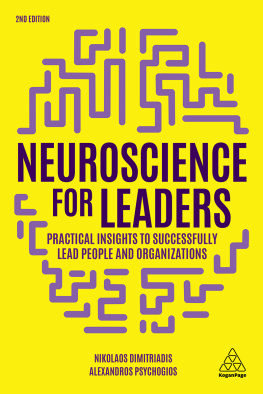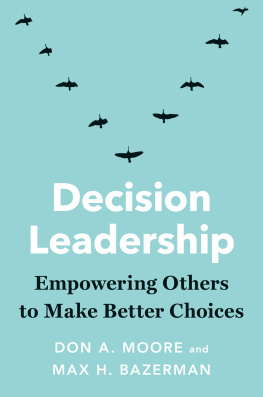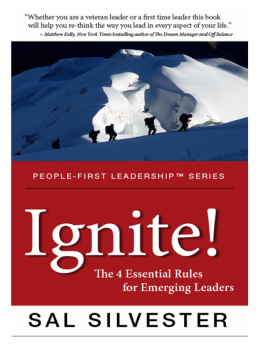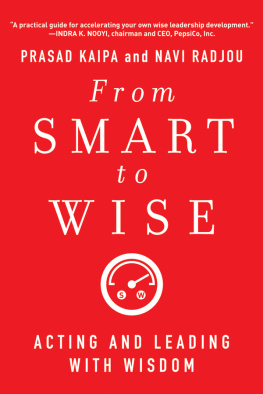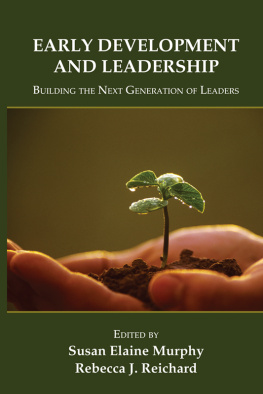Keren Tsuk, PhD, is a keynote speaker, consultant, and thought leader in twenty-first century leadership. Founder of the consulting firm Wisdom to Lead, Tsuk specializes in developing senior management teams and corporate leadership. She guides companies and senior management teams to reach their full potential using various techniques in the field of mindfulness. She has developed an innovative Mindfulness Based Leadership (MBL) course and retreat, which she conducts for organizations around the world. Her practice extends to assisting executives to discover their own inner wisdom and maximize their overall leadership potentialboth in and out of the workplace. With more than twenty years of experience working with senior management in the areas of transition, growth, and development processes, Tsuk has worked with companies such as Check Point, Verint, Amdocs, Ex Libris, Google, and Siemens. As a keynote speaker on the topic of the relationship between mindfulness and leadership, she has lectured at conferences worldwide and has been invited to speak at universities around the world, instructing graduate business school courses at PolyU in Hong Kong and Lahav Executive Education at Tel Aviv University, as well as teaching executive education courses at IDC Herzliya.
Ariely, Dan. A Taste of Irrationality: Predictably Irrational and Upside of Irrationality. HarperCollins, 2010.
Bachkirov, Alexandre A. Managerial Decision Making under Specific Emotions. In Journal of Managerial Psychology 30, no. 7 (2015): 86174.
Barley, Stephen R., and Gideon Kunda. Design and Devotion: Surges of Rational and Normative Ideologies of Control in Managerial Discourse. In Administrative Science Quarterly (1992): 36399.
Bechara, Antoine, et al. Deciding Advantageously before Knowing the Advantageous Strategy. In Science 275, no. 5304 (1997): 129395.
Boddy, Clive R. Corporate Psychopaths: Uncaring Citizens, Irresponsible Leaders. In Journal of Corporate Citizenship 49 (2013): 816.
Bohm, David. Unfolding Meaning: A Weekend of Dialogue. Routledge, 1985.
Bolier, Linda, et al. Positive Psychology Interventions: A Meta-Analysis of Randomized Controlled Studies. In BMC Public Health 13, no. 1 (2013): 120.
Bostrom, Nick. Existential Risks: Analyzing Human Extinction Scenarios and Related Hazards. In Journal of Evolution and Technology 9 (2002).
Brenan, Megan. Nurses Keep Healthy Lead as Most Honest, Ethical Profession. In Gallup, January 14, 2021. https://news.gallup.com/poll/224639/nurses-keep-healthy-lead-honest-ethical-profession.aspx.
Brown, Bren. Dare to Lead: Brave Work. Tough Conversations. Whole Hearts. Random House, 2018.
Business Roundtable Redefines the Purpose of a Corporation to Promote An Economy That Serves All Americans. In Business Roundtable, August 19, 2019. www.businessroundtable.org/business-roundtable-redefines-the-purpose-of-a-corporation-to-promote-an-economy-that-serves-all-americans.
Chambers, Richard, Barbara Chuen Yee Lo, and Nicholas B. Allen. The Impact of Intensive Mindfulness Training on Attentional Control, Cognitive Style, and Affect. In Cognitive Therapy and Research 32, no. 3 (2008): 30322.
Csikszentmihalyi, Mihaly. Society, Culture, and Person: A Systems View of Creativity. Springer Netherlands, 2014.
Dekeyser, Mathias, et al. Mindfulness Skills and Interpersonal Behaviour. In Personality and Individual Differences 44, no. 5 (2008): 123545.
Diamond, Jared. Collapse: How Societies Choose to Fail or Survive. Viking, 2005.
Duhigg, Charles. What Google Learned from Its Quest to Build the Perfect Team. In The New York Times Magazine, 26, 2016.
Durrah, Omar, Monica Chaudhary, and Moaz Gharib. Organizational Cynicism and Its Impact on Organizational Pride in Industrial Organizations. In International Journal of Environmental Research and Public Health 16, no. 7 (2019): 1203.
Dust, Scott B., et al. Ethical Leadership and Employee Success: Examining the Roles of Psychological Empowerment and Emotional Exhaustion. In The Leadership Quarterly 29, no. 5 (2018): 57083.
Dweck, Carol S. Mindset: The New Psychology of Success. Random House, 2008.
Ebert, Norbert. Individualisation at Work: The Self Between Freedom and Social Pathologies. Routledge, 2016.
Edmondson, Amy C. The Fearless Organization: Creating Psychological Safety in the Workplace for Learning, Innovation, and Growth. John Wiley & Sons, 2018.
Fadde, Peter J., and Gary A. Klein. Deliberate Performance: Accelerating Expertise in Natural Settings. In Performance Improvement 49, no. 9 (2010): 514.
Farb, Norman A. S., et al. Minding Ones Emotions: Mindfulness Training Alters the Neural Expression of Sadness. In Emotion 10, no. 1 (2010): 25.
Fleischman, Gary M., et al. Ethics versus Outcomes: Managerial Responses to Incentive-Driven and Goal-Induced Employee Behavior. In Journal of Business Ethics 158, no. 4 (2019): 95167.
Fleming, Peter, and Andrew Sturdy. Just Be Yourself!: Towards Neo-normative Control in Organisations. In Employee Relations 31, no. 6 (2009): 56983.
Gkhan, Nurper, Edward F. Meehan, and Kevin Peters. The Value of Mindfulness-Based Methods in Teaching at a Clinical Field Placement. In Psychological Reports 106, no. 2 (2010): 45566.
Goleman, Daniel. Emotional Intelligence. Wiley, 2012.
Greenleaf, Robert. The Power of Servant Leadership. San Francisco: Berrett-Koehler, 2002.
Guess, C. Dominik, Sarah J. Donovan, and Dag Naslund. Improving Dynamic Decision Making through Training and Self-Reflection. In Judgment and Decision Making 10, no. 4 (2015): 28495.
Helyer, Ruth. Learning through Reflection: The Critical Role of Reflection in Work-Based Learning (WBL). In Journal of Work-Applied Management 7, no. 1 (2015): 1527.
Hofmann, Stefan G., et al. The Effect of Mindfulness-Based Therapy on Anxiety and Depression: A Meta-Analytic Review. In Journal of Consulting and Clinical Psychology 78, no. 2 (2010): 169.
Jackson, Tim. Prosperity without Growth: Foundations for the Economy of Tomorrow. Taylor & Francis, 2016.
Kabat-Zinn, Jon. Wherever You Go, There You Are: Mindfulness Meditation in Everyday Life. Hyperion Books, 1994.
Kegan, Robert, and Lisa Laskow Lahey. An Everyone Culture: Becoming a Deliberately Developmental Organization. Harvard Business Review Press, 2016.
Kelly, Brendan D. Buddhist Psychology, Psychotherapy and the Brain: A Critical Introduction. In Transcultural Psychiatry 45, no. 1 (2008): 530.
Knapp, Samuel, Michael C. Gottlieb, and Mitchell M. Handelsman. Enhancing Professionalism through Self-Reflection. In Professional Psychology: Research and Practice 48, no. 3 (2017): 16774.
Ko, Changsuk, et al. Ethical Leadership: An Integrative Review and Future Research Agenda. In Ethics & Behavior 28, no. 2 (2018): 10432.
Lazar, Sara W., et al. Meditation Experience Is Associated with Increased Cortical Thickness. In Neuroreport 16, no. 17 (2005): 1893.
Linacre, Simon. Time Well Spent? Differing Perceptions of Breaks at Work. In Human Resource Management International Digest (2016).
Mantini, Dante, et al. Default Mode of Brain Function in Monkeys. In Journal of Neuroscience 31, no. 36 (2011): 1295462.
Marturano, Janice. Finding the Space to Lead: A Practical Guide to Mindful Leadership. Bloomsbury Publishing USA, 2014.
McNamara, Carter. Overview of Cynicism in Business Organizations, Ethical Profession. In Management Help (n.d.). https://managementhelp.org/personalwellness/cynicism/index.htm.


